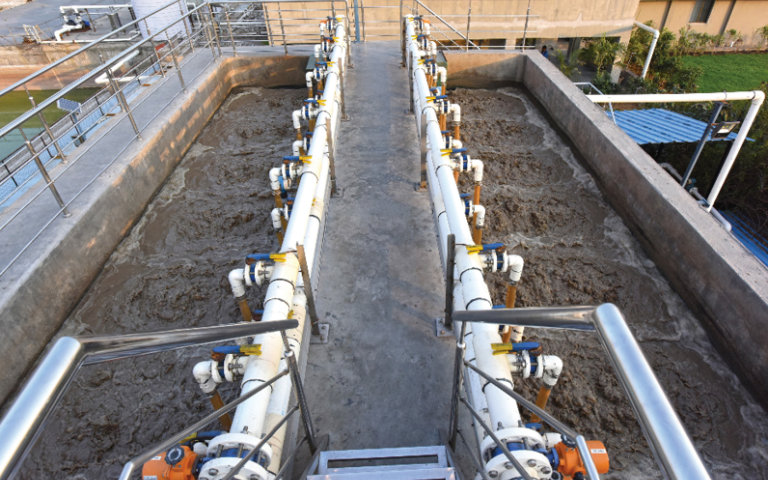Wastewater Treatment with Membrane Bioreactor (MBR) Technology


At Spans Envirotech Pvt. Ltd., we are leaders in innovative wastewater treatment solutions, specialising in the application of Membrane Bioreactor (MBR) technology. Our dedicated team of experienced engineers designs and implements custom solutions that effectively clean both industrial and municipal wastewater, optimizing treatment efficiency and reducing operational costs.
Our Expertise
With years of specialized knowledge and hands-on experience, we offer tailored wastewater treatment solutions using Membrane Bioreactor (MBR) technology across various industries, including manufacturing, food and beverage, chemical processing, and municipal wastewater treatment. Our expertise enables us to address unique challenges and deliver optimal results for each client and application, ensuring compliance with environmental regulations and promoting sustainability.
What is MBR Technology?
Membrane Bioreactor (MBR) technology is an advanced wastewater treatment process that combines biological treatment and membrane filtration. Microorganisms break down organic pollutants, while membrane filters act as a physical barrier to remove solid particles, bacteria, viruses, and other pathogens. This dual-action process results in the production of high-quality treated water that meets stringent regulatory standards for discharge or reuse.

Benefits of MBR Technology
High-Quality Water: Produces clean water meeting strict quality standards, suitable for various applications, including irrigation, industrial processes, and environmental discharge.
Space-Saving Design: The compact and modular design of MBR systems requires significantly less space compared to traditional wastewater treatment systems, making it ideal for retrofitting existing facilities or installing in limited space areas.
Reduced Chemical Use: By utilizing biological processes and membrane filtration, MBR technology minimizes the need for additional chemicals such as coagulants and flocculants, reducing operational costs and environmental impact.
Flexibility: MBR systems can be easily customized and scaled to accommodate varying flow rates, contaminant loads, and treatment objectives, providing flexibility and adaptability to meet changing wastewater treatment needs effectively.
Where Can MBR Technology Be Used?
MBR technology is versatile and well-suited for treating various types of wastewater, including:
Industrial Wastewater
Generated from diverse industries such as manufacturing, food and beverage, chemical processing, pharmaceuticals, and more, MBR technology offers efficient and reliable treatment solutions tailored to specific industrial wastewater characteristics and regulatory requirements.


Municipal Wastewater
Municipal wastewater, including domestic sewage from households, communities, and commercial establishments, can be effectively treated using MBR technology to remove pollutants, protect public health, and safeguard the environment by ensuring compliance with environmental regulations.
Key Stages of the Membrane Bioreactor (MBR) process:


Biological Treatment (Bioreactor):
At this stage, microorganisms are added to the wastewater to break down organic contaminants via aerobic or anaerobic biological processes, turning them into simpler and less dangerous chemicals.
Membrane Filtration (Membrane):
The treated wastewater from the bioreactor is then passed through membrane filters, such as microfiltration or ultrafiltration membranes, which act as a physical barrier to separate and remove suspended solids, bacteria, viruses, and other pathogens from the water, resulting in clean and high-quality treated water that is ready for discharge or reuse.
Additional Information

Optimized & Industry-ready Solutions: Our MBR systems are designed to meet the specific needs and requirements of each client and application, providing optimized and industry-ready solutions that improve treatment efficiency and lower operational costs.

Integrated Solutions to Maximize Resource Recovery: Our comprehensive solutions include technology, engineering, and investments to set up “waste to value” facilities, maximising energy and resource recovery from any waste stream and promoting a circular economy towards building a zero waste future.
